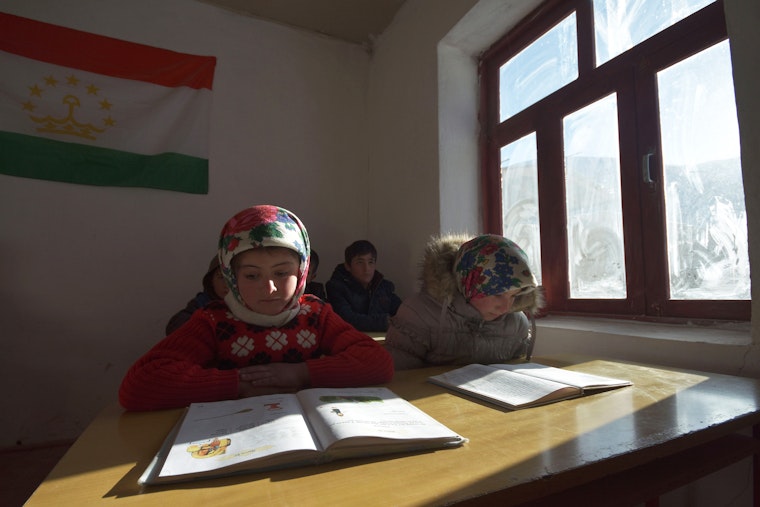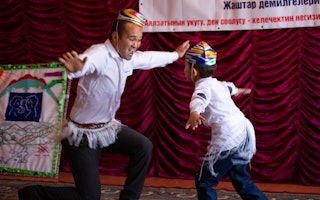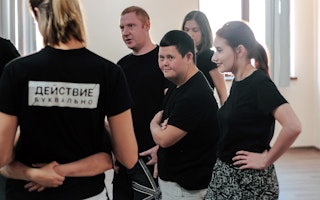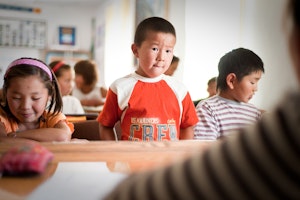Q&A: How Parents in Tajikistan Are Organizing for Their Children’s Rights

Recently, after a major campaign by a coalition of people with disabilities, their parents, and their allies, Emomali Rahmon, the president of Tajikistan, signed the UN Convention on the Rights of Persons with Disabilities. A coalition member, Laylo Nafisshoeva, spoke with Open Society's Olena Sydorenko-Szabo about this victory and the coalition's future.
Before you were an advocate for the rights of children with disabilities and their parents, you were a journalist. Can you walk us through that transition?
When my son Alisher was born, we realized he had special needs. My husband and I tried to have an arrangement with the nearby kindergarten, but the director refused to accept additional responsibilities. We also considered hiring a babysitter, but we couldn’t afford it. Eventually, we learned about a center for children with disabilities, which provided rehabilitation, education, and day care services. I still worked as a radio journalist at this point, but I started to feel like I couldn’t do it wholeheartedly anymore.
Why not?
Because I was more interested in what was going on at the center. Step by step, I became involved in the parents’ movement—and soon I came to realize that my heart and soul was now in this advocacy work. It was a hard choice, but I realized that being fully involved in this kind of work would be good for my child and for other parents in a similar situation.
What is it like to raise a child with a disability in Tajikistan today? How will the president’s signing of the UN Convention on the Rights of Persons with Disabilities help?
It is not easy. It is difficult if the mother does not know her rights—which is, unfortunately, quite common, especially in rural areas. The convention is important because it is a basis for defending the rights of children with disabilities; it is important because it is possible now for advocates to refer to an international document. We had a national-level document before [the National Concept of Inclusive Education adopted by the parliament in 2011], it’s true, but this is of greater significance and force.
Tell us more about the coalition?
The Coalition of Associations of Parents of Children with Disabilities covers the whole country and brings together parent groups advocating for the rights of their children. One of the first initiative groups was the parent association in Dushanbe. Their goal was to connect parents with one another. The network that started this, way back in 2009, now has 36 member organizations. The coalition members work towards the same goal: to advance rights of children with disabilities, improve access to health and education services, and promote social inclusion.
What are the advantages of a coalition?
Individually, parents do not have a lot of power, but a nationwide coalition of many small groups is much stronger. The coalition has gained a reputation by now; the relevant ministries and local authorities know us. And if we need approval for our initiatives, it always helps to refer to the regions where the coalition members were successful in implementing the same or similar initiatives.
How will the convention’s greater weight play out in the real world?
It is easier to work with the state structures if you can refer to a document that has the president’s approval. For instance, in February, after the president issued the order to sign the convention—even before it was actually signed—referring to it helped us obtain permission by a municipal government for a land allocation that we’ll use to build a center where parents can get support and learn more about the resources available to them.
What does it mean for you and your child, personally?
For my son, it adds to our hope that the changes that had started already will get a new push—and that he has better prospects for his future. For me, it is important because, as I said, it will strengthen my advocacy work. And it will make it easier for advocates to engage in awareness-building activities by disseminating information about the convention. Of course, there is no expectation that everything will automatically change overnight because of the signature—but it’s still a big boost.
Now that the convention has been signed, what’s next for the disability rights movement in Tajikistan?
We will continue to work. The changes have started, and slowly things are improving; but this is just the beginning, and we need to do a lot. We plan to focus more on maintaining the coalition and regional associations which helped make this victory possible. More specifically, we want to address the problem of a lack of specialists in the country who can help children with disabilities. As a first step, we decided to print out 500 copies of the convention to use for our advocacy. And before that, we funded a new translation of the document so that it uses the up-to-date terminology when referring to people with disabilities. We hope this will help change the way people with disabilities are described in official documents.
The Coalition of Associations of Parents of Children with Disabilities is supported by the Open Society Institute Assistance Foundation—Tajikistan.


